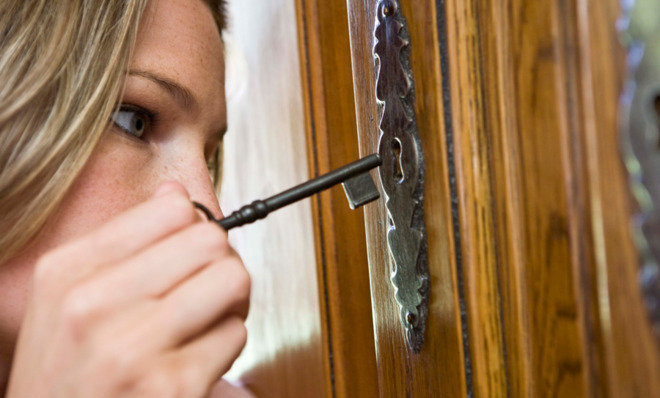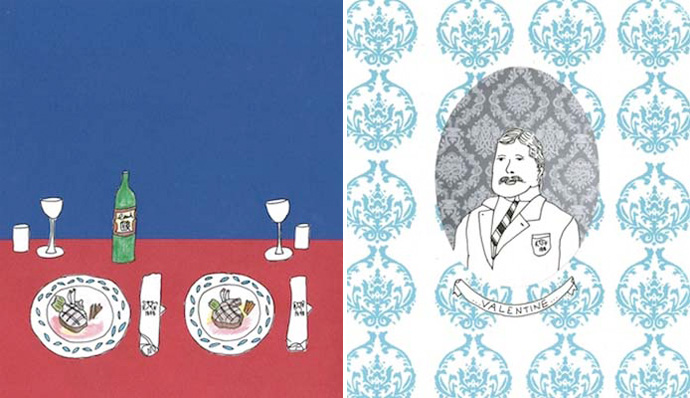My journey to the top of the social ladder
I climbed to the top of New York's upper echelon, only to wonder what I was doing there

A free daily email with the biggest news stories of the day – and the best features from TheWeek.com
You are now subscribed
Your newsletter sign-up was successful

When I was a successful business owner living a privileged life in midtown Manhattan, it never occurred to me that I could be happy with anything less. There was never a time, whether I was lunching on $40 salads at Bergdorf's or getting a $600 haircut, that I thought, "I don't need to be doing this." There were no benefits or fundraisers too unimportant to miss; no designer exercise class too ridiculous or expensive to pass up. I believed making money made me happy. Until the day it no longer did.
Five years ago, I was the second half of a startup commercial real estate company. That company was also my marriage. My husband and I had met at work a few years earlier when I was a receptionist. He was a real estate broker. We branched out and started our own company in early 2002. In the good years, we made money; about $120,000 a month, and we enjoyed it. In the years we didn't make money we had to do twice the work just to break even. It was always hard work. Owning his own business had always been my husband's dream, but he never stopped asking me if this life was what I wanted, as if it were all my choice. Did I really want the high risk and reward of owning a business in New York City? Did I really want to try to build a national company?
My answer was always, 'Yes.'
The Week
Escape your echo chamber. Get the facts behind the news, plus analysis from multiple perspectives.

Sign up for The Week's Free Newsletters
From our morning news briefing to a weekly Good News Newsletter, get the best of The Week delivered directly to your inbox.
From our morning news briefing to a weekly Good News Newsletter, get the best of The Week delivered directly to your inbox.
(More from Narratively: Hobknobbing with a billionaire)
I came to New York in 1994 to attend Columbia University, moving northeast from Kentucky, where I had grown up and attended public school. Columbia hadn't been my first choice of colleges. I had wanted to go to either NYU to (study stage managing) or to the University of Chicago (to study anything), but Columbia was my parents' choice. They, with the help of a bank or two, were paying, so they got to decide.
Columbia turned out to be the perfect school for me. I studied Arabic and learned to play squash. I ate bagels and walked all over this spectacular city.
No one else from my hometown had come to this school, but I wasn't exactly on my own. My parents' friends' son, who we'll call Tad, was also at Columbia. He was a year ahead of me. Tad looked me up when I arrived at Columbia and invited me to lunch at the off-campus residence where he was living with twenty or so other Columbia students. I didn't know it was a fraternity house. There were no obvious Greek letters plastered above the front door, no tiki torches, no doughy young men in cargo shorts and flip-flops lounging about the entrance. At the townhouse men wore sport coats, sweater vests, and loafers. They rowed crew and drank Scotch and planned careers in finance. The women (it was a co-ed fraternity; the only one on campus) all seemed to be studying art history or literature. They dressed attentively and were 'put together' in three styles: Nantucket (jeans and striped sweaters), Sotheby's (slacks and blouses) and Cipriani (black skirts and T's).
A free daily email with the biggest news stories of the day – and the best features from TheWeek.com

(More from Narratively: New York City's vanguards of classical music)
Most of these students had graduated from East Coast or foreign boarding schools and had little in common with the general Columbia population. They had grown up sneaking into New York City nightclubs, spending long weekends at mansions in northern New Jersey, and shopping at Prada for wardrobe basics.
To be fair, not all the membership was privileged, but enough to set a tone for the place. Aspirations and peer pressure moved everyone else in line. The culture in the townhouse was foreign to me and, in a sense, antiquated. The fraternity, like the secret societies of Yale or the eating clubs at Princeton, was a relic of the time when Old New York sent its sons to Columbia to receive, if not a modern education, a certain social ratification. The membership stood by its social rituals. At cocktail parties, dinners and afternoon teas, I met the entire membership. I knew that at these events they were vetting me, weighing my candidacy. I can't remember if I was nervous. Later, I would learn that I was taken in as a kind of cultural wild card. In order to get members to vote me in, Tad talked up my Kentucky family "legacy." My father's wholesaling company was transformed on the fraternity debate floor into a large tobacco plantation that had been in the family since my great-great-granddaddy; my lack of Southern accent explained as a result of my rigorous education. None of this was true. Tad didn't know me from Adam, and he had a flair for the theatrical. His strategy worked. One of the brothers who voted for me thought I was cute. He also thought I rode sidesaddle.
There was much irony in being packaged as a Southern belle. My parents don't even consider themselves Southern (my mother comes from Oklahoma), but my parents were the reason I was at the townhouse in the first place. Family obligation — Tad's parents were good family friends — was what kept me returning. When the fraternity asked me to join the membership, I obliged. I moved out of the cinderblock freshman dorm and into the townhouse immediately. I bought some new clothes and developed a taste for Champagne; I took my meals in the townhouse dining room and read in the building's library. This wasn't exactly torture. I probably would have done the same thing had I not felt the family obligation. After all, these were people who got what they wanted. And they wanted me.
The townhouse was student-run, and in my second semester I was elected building manager. I had my work cut out for me. Pedigreed as it was, the building had been occupied by college students for one hundred years, and a century of undergraduate living that had clearly taken its toll. There were large areas where plaster molding was missing, broken windows, and a basement that needed two sump pumps. The pantry was stacked to the ceiling with mismatched dishes. The kitchen posed a fire hazard. Garbage was everywhere: on the roof, in the backyard, along the hallways. Undergrads who stored their belongings in the boiler room, promising to come back once they were settled into their new lives, never did. In my first week as manager I filled two dumpsters with trash.
The membership was unwilling to admit that the house was falling apart. Why should they care? To the greater Columbia community, our building was a paragon of high style. Not only were our members good-looking and well-presented, our parties always had the best beer, in bottles and on tap. Guests could roam the ballroom (yes, it was a bona fide ballroom) that opened onto balconies overlooking Riverside Drive and featured a state-of-the-art sound system. We also had the pool room, which offered both billiards and snooker. Most importantly, we let them trash the place every week.

(More from Narratively: The digital darling conquering the fashion world)
As building manager, it bothered me that willful negligence was our trademark, but there was nothing I could do about it. My brothers and sisters seemed oblivious to the guests who spilled beer on the billiards table or threw bottles onto the sidewalk. They would approach me at parties and ask, "What's wrong?" One repeatedly told me that I looked bored. I wasn't; I was annoyed. I was charged with maintaining this structure, this monument to New York Society, but its legacies seemed not to care. When my housemates were nursing hangovers with late afternoon brunch and shopping at Barney's, I spent the day supervising cleanup and repairs. I could have slacked off, too. But I didn't.
I learned two things at the townhouse. One, that I loved the real estate business, especially building management. Two, that good tenants are hard to find. My tenants were a bunch of rich kids who had never learned how to clean up after themselves (or never had to). By graduation I knew I didn't want to be these kids. I wanted to be their parents.
Read the rest of this story at Narratively.
Narratively is an online magazine devoted to original, in-depth and untold stories. Each week, Narratively explores a different theme and publishes just one story a day. It was one of TIME's 50 Best Websites of 2013.
-
 The ‘ravenous’ demand for Cornish minerals
The ‘ravenous’ demand for Cornish mineralsUnder the Radar Growing need for critical minerals to power tech has intensified ‘appetite’ for lithium, which could be a ‘huge boon’ for local economy
-
 Why are election experts taking Trump’s midterm threats seriously?
Why are election experts taking Trump’s midterm threats seriously?IN THE SPOTLIGHT As the president muses about polling place deployments and a centralized electoral system aimed at one-party control, lawmakers are taking this administration at its word
-
 ‘Restaurateurs have become millionaires’
‘Restaurateurs have become millionaires’Instant Opinion Opinion, comment and editorials of the day